
What is Transitional Care?
Transitional Care is for patients that are ready to discharge from a traditional acute-care hospital but are not yet ready to be at home or in their previous living situation. These patients still require additional skilled medical care, nursing care, or rehabilitation services.
Admission Inquires
Phone: 509-843-1591
Fax: 509-843-5087
Transitional Care flyer.pdf
Our team at Garfield County Hospital District
is equipped to care for patients with complex needs, including:
- Post Surgical: Cardiac, neuro, orthopedic, abdominal, and more
- Respiratory: specialized treatments and support
- Wound Care: special attention for wound healing and prevention
- Intravenous (I.V.) Antibiotics and therapy: to treat a variety of infections and conditions
- Specialized Therapy: Including physical therapy, occupational therapy, speech therapy and an array of supportive services.
- Teaching and Training: Patient education and teaching on management of new complex conditions, and management of pre-existing conditions.
- Nutritional Support: education and oversight of appropriate diet choices, nutritional needs and management of tube feedings.
- Coordination and Ongoing Assessment of Complex Plans of Care: RN oversight and team collaboration to modify care plans as frequently as patients need.
Why Garfield County Hospital?
- Our transitional care program is supported with evidence-based best practices through a partnership with Allevant Solutions developed by Mayo Clinic and Select Medical. We provide:
- A personalized plan of care.
- Regular Care Team Rounds involving you and your family.
- Hospital level nurse staffing to keep you safe and meet your needs.
- A home-like environment that accommodates family and individualized activity programs, as well as in therapy in several environments.
- On-site and readily available physicians/providers.
- On-site radiology, laboratory, and pharmacy teams that will address all your medical needs.
- Friendly and familiar staff.
- High quality care close to home.
- Our Transitional Care Program is centered on teamwork, communication, and collaboration. Your care team will work with you and your loved ones on a personalized plan, support your goals, and meet with you on a regular basis to celebrate successes and adjust the plan.
Frequently Asked Questions:
How long do patients typically stay in Transitional Care?
Most stays in Transitional Care are a few days to a few weeks; however some patients may stay longer if they have daily qualifying skilled care needs.
The majority of patients in our program improve their health and rehabilitation status during their stay, and the majority of program patients who lived at home prior to their hospitalization are discharged back home after Transitional Care.
Is Transitional Care covered by my insurance plan?
Transitional Care is predominantly covered by the Medicare “Swing Bed” benefit. Some other insurance providers may cover this care as well. If you are having a planned hospitalization and think you might need care after your stay, we can check if Transitional Care would be covered so you can plan ahead of time to come to our Transitional Care Program.
Why is the program called “Transitional Care” and is it the same as “Swing Bed”?
Our program is called Transitional Care because it is a model focused on helping patients transition from a hospital stay to their highest level of independence. We use hospital level resources, team processes, best practices, and extra clinical education to support this “transition.” Since most patients receive this care under Medicare, this level of care is sometimes also referred to as “Swing Bed.”
How is Transitional Care different from the care received at a Skilled Nursing Facility or nursing home?
Because we are a hospital, we can deliver Transitional Care with high levels of safety, quality, and flexibility with hospital-based resources including on-site lab, radiology, and immediate access to physicians/providers and other caregivers.
Our hospital-based Transitional Care program provides up to 2 – 3 times more available nurse hours per patient day compared to most skilled nursing facilities.
We hold Bedside Rounds with the patient, family and care team on a scheduled basis, so everyone understands your plan of care, identifies things that need to be addressed, and plans for a safe discharge.
---------------------------------------------------------------------------------------------------------------------------------------------------------------------------------------------
Garfield County Hospital Transitional Care Outcomes
Transitional Care Average Length of Stay: 17 Days (23 patients discharged)
This is the mean average length of Transitional Care patient stays at Garfield County Hospital for patients whose last day of Transitional Care was between June 1st 2021 to May 31st 2022. This is calculated by adding the number of days patients stayed in Transitional Care divided by the number of patients whose last day of Transitional Care is within the date range. The calculation includes all dispositions (home, assisted living, end of life, etc.) The calculation does not include the day of discharge.
Discharge to Acute During Transitional Care Stay Equal to or Less than 30 days: 17 % (of 23 patients)
This measure describes the percentage of Garfield County Hospital patients who were discharged directly back to an acute care hospital inpatient bed during a Transitional Care Stay of 30 days or less. The return to an acute care hospital bed may be for any reason (for example, a medical procedure planned prior to Transitional Care admission, or unplanned, if medical needs change during the stay). The denominator includes all patients with whose last day of Transitional Care is within the date range of June 1st 2021 to May 31st 2022.
Return to Independence: 61% (of 23 patients)
This measure describes the percentage of Garfield County Hospital patients who lived at home or assisted living prior to their Transitional Care stay who were then discharged back to home or assisted living from Transitional Care. This only includes patients admitted with a prior living situation of or assisted living whose last day of Transitional Care was within the date range of June 1st 2021 to May 31st 2022.
